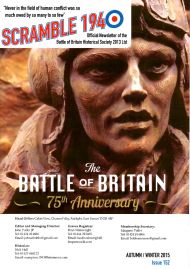Foreward

The daylight bombing of London itself marked the beginning of the fourth phase. It opened on 7 September, with attacks on the docks, and lasted most of the month; though serious in itself, it brought vital relief to the fighter airfields which had been under such pressure. This phase reached a climax on 15 September, when over one thousand sorties were flown against the capital in the afternoon and at night. On that occasion the Luftwaffe lost 61 aircraft. It was, in Sir Winston Churchill's words: "One of the decisive battles of the war." Churchill went on to say: "The gratitude of every home in our Island, in our Empire, and indeed throughout the world.., goes out to the British airmen who. undaunted by odds, unwearied in their constant challenge and mortal danger, are turning the tide of world war by their prowess and by devotion. Never in the field of human conflict was so much owed by so many to so few."
Throughout October, the fifth and last phase of the Battle saw the decline of enemy daylight attacks on London and an increase in the night bombing of Britain's major ports and industrial centres. At the beginning of the struggle the Luftwaffe had 2,790 aircraft to launch against England. Britain had fewer than 60 fighter squadrons, - some 650 aircraft - and the ground staff had to work sometimes 16 hours a day to keep the machines in the air. Between 24 August and 6 September alone, Fighter Command lost 103 pilots and 128 seriously wounded, while 366 fighters were put out of action.
By the end of the Battle the home base had been secured. The Royal Air Force could now turn to wider tasks. The long fight for Malta, North Africa and the control of the Mediterranean; the mounting bomber offensive against Germany; the unstinting efforts of our maritime airmen whose contribution was central to winning the Battle of the Atlantic; the struggle for air supremacy over North-West Europe, without which the Normandy invasion would have been impossible; and the support of the invasion campaign itself: all were essential to final victory in Europe. In the Far East too, most memorably in the appalling conditions of the Burma campaign, the Royal Air Force played a major part. In commemorating the airmen who fought in the Battle of Britain, we pay tribute also to those who in later years of the war served in all the Allied Forces at sea, land, and air.
Today we record our continuing sense of gratitude for what was achieved in the darkest moments of war, and we rededicate ourselves to strive untiringly for peace, justice, and freedom in the world. With this in mind, the Battle of Britain Historical Society has vowed that the events of this period in 1940, and those men that took to the skies against a mightier and superior enemy shall never be forgotten. In 2005 the Society created the greatest monument in sculpture elegance on the Victoria Embankment as an everlasting tribute to those that served. The Society is caring for all known graves of those who fell during the Battle and later during the war. The Society now has a programme where they can undertake to educate todays younger generation and the technology available to us today allows us to teach others about the Battle of Britain, the importance of victory and why the Battle had to be won.
The aim of the Battle of Britain Historical Society in an ongoing venture, it will go on forever and they will succeed but only if you can help. Become a member, because membership is strength and it will be this strength that will become the greatest asset that the Society can achieve.
